一、props
props 是使用频率最高的一种通信方式,常用于:父 ↔ 子
- 若父传子: 属性值是非函数;
- 若子传父: 属性值是函数。
- Props : 指的是传递给子组件的属性。子组件通过
props接收数据。 - 单向数据流 : 数据通过
props从父组件流向子组件,子组件不能直接修改props(这是一个原则,确保了数据流的一致性)。所有变化应通过父组件中的数据传递。
javascript
// Father.vue
<template>
<div class="father">
<h2>父组件</h2>
<h3>汽车:{
{car}}</h3>
<h3 v-show="toy">子给的玩具:{
{toy}}</h3>
<Child :car="car" :sendToy="getToy"></Child>
</div>
</template>
<script setup lang='ts'>
import Child from './Child.vue'
import {ref} from 'vue'
const car = ref('奔驰')
const toy = ref('')
const getToy = (value:string)=> {
console.log('父',value);
toy.value = value;
}
</script>
<style>
</style>
javascript
// Child.vue
<template>
<div class="child">
<h2>子组件</h2>
<h2>父给的车:{
{props.car}}</h2>
<button @click="props.sendToy(toy)">把玩具给父亲</button>
</div>
</template>
<script setup lang='ts'>
import { ref } from 'vue'
const toy = ref('奥特曼')
// 声明接收父组件
const props = defineProps(['car', 'sendToy'])
</script>
<style>
</style>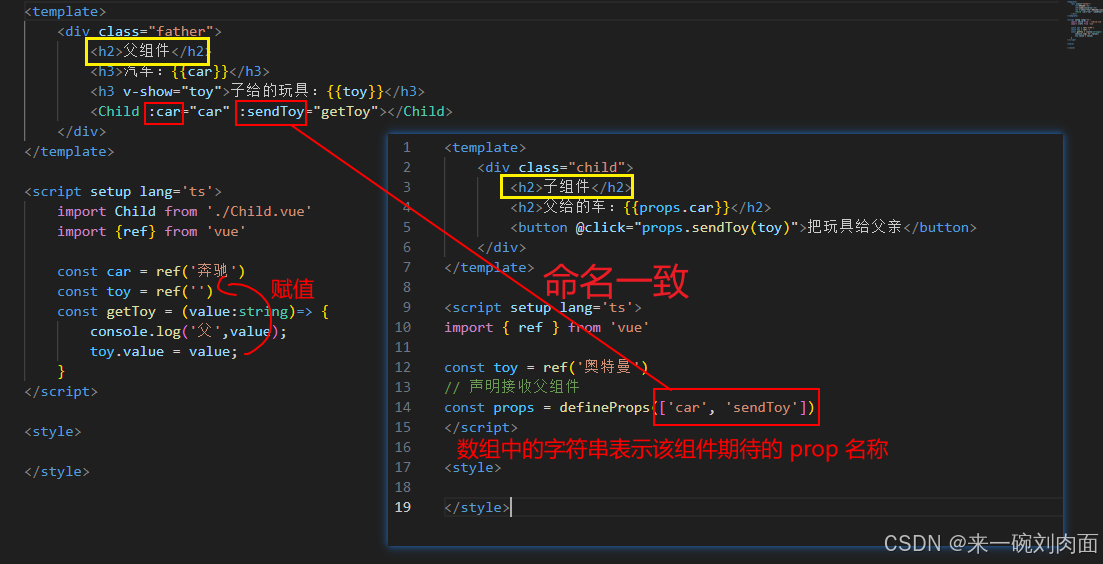
二、emit 自定义事件
javascript
// Father.vue
<template>
<div class="father">
<h1>父组件</h1>
<h5 v-show="toy">子组件给的玩具:{
{ toy }}</h5>
<!-- 给子组件 Child 绑定事件 -->
<Child @send-toy="getToy"></Child>
</div>
</template>
<script setup lang='ts'>
import Child from './Child.vue'
import {ref} from 'vue'
const toy = ref('')
// 用于保存传递过来的玩具
const getToy = (value:string,str:string) => {
console.log('来了来了',value);
toy.value = str;
}
</script>
<style>
</style>
javascript
// Child.vue
<template>
<div class="child">
<h1>子组件</h1>
<h5>玩具:{
{toy}}</h5>
<button @click="emit('send-toy','子组件传递的',toy)">给父亲</button>
</div>
</template>
<script setup lang='ts'>
import { ref } from 'vue'
const toy = ref('奥特曼')
// 声明事件
const emit = defineEmits(['send-toy'])
</script>
<style>
</style>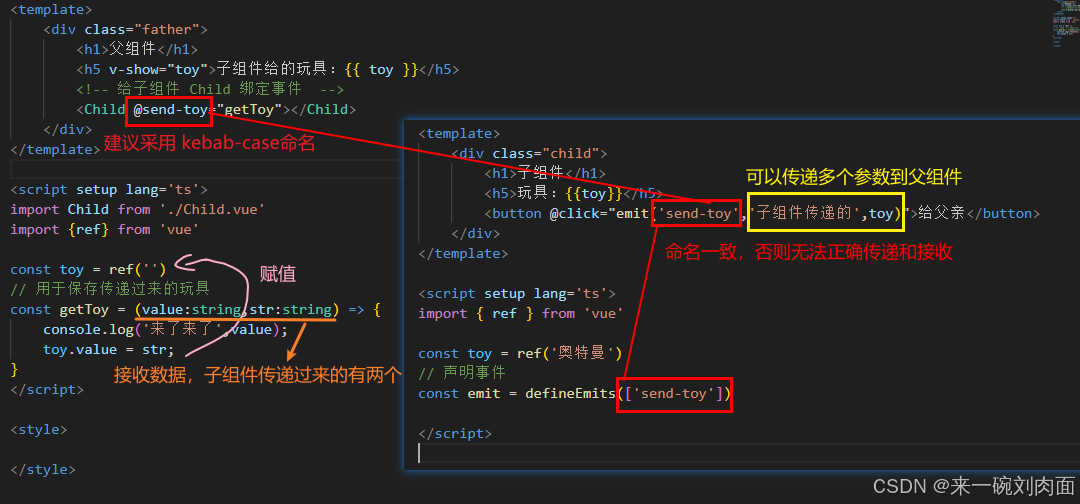
三、mitt
在 Vue 3 中,mitt 是一个小型的事件发射器库,常用于在组件之间进行非父子关系的数据传递或事件通信。使用 **mitt**可以简化事件的发布和订阅,使得不同组件之间的交流更加方便。
mitt 是一个轻量级的事件总线,允许在多个组件之间进行事件传递。只需创建一个 mitt 实例,然后在需要的组件中注册事件监听器和触发事件。
安装 mitt:
javascript
pnpm install mitt
// 或者
npm install mitt(一)创建 mitt 实例:
在 Vue 3 中,可以创建一个 mitt 实例,通常在 src 目录下的一个单独文件中进行管理,比如可以创建一个 emitter.ts 或 mitt.ts 文件:

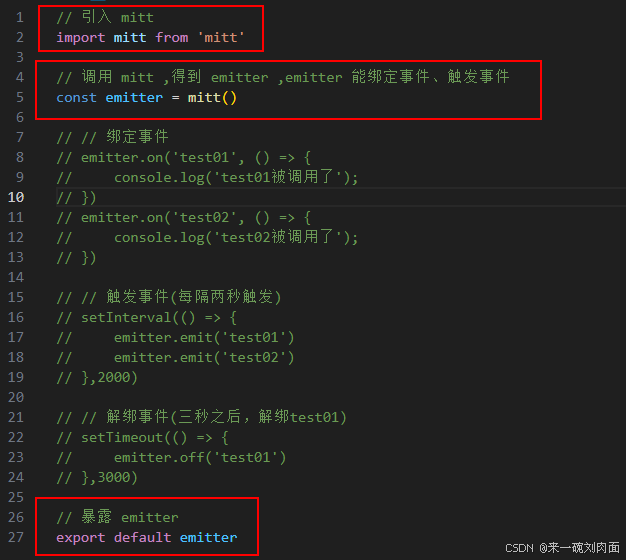
javascript
// 引入 mitt
import mitt from 'mitt'
// 调用 mitt ,得到 emitter ,emitter 能绑定事件、触发事件
const emitter = mitt()
// // 绑定事件
// emitter.on('test01', () => {
// console.log('test01被调用了');
// })
// emitter.on('test02', () => {
// console.log('test02被调用了');
// })
// // 触发事件(每隔两秒触发)
// setInterval(() => {
// emitter.emit('test01')
// emitter.emit('test02')
// },2000)
// // 解绑事件(三秒之后,解绑test01)
// setTimeout(() => {
// emitter.off('test01')
// },3000)
// 暴露 emitter
export default emitter(二)在组件中使用 mitt :
可以在不同的组件中引入这个**mitt** 实例,进行事件的注册和触发。
javascript
// Father.vue
<template>
<div class="father">
<h1>父组件</h1>
<Child01></Child01>
<Child2></Child2>
</div>
</template>
<script setup lang='ts'>
import Child01 from './Child01.vue';
import Child2 from './Child2.vue'
</script>
<style>
</style>
javascript
// Child01.vue
<template>
<div class="child1">
<h2>子组件01</h2>
<h4>玩具:{
{toy}}</h4>
<button @click="emitter.emit('send-toy',toy)">玩具给子组件2</button>
</div>
</template>
<script setup lang='ts'>
import { ref } from 'vue'
import emitter from '../utils/emitter';
const toy = ref('奥特曼')
</script>
<style>
</style>
javascript
<template>
<div class="child2">
<h2>子组件2</h2>
<h4>电脑:{
{ computer }}</h4>
<h4>子组件1给的玩具:{
{ toy }}</h4>
</div>
</template>
<script setup lang='ts'>
import { ref,onUnmounted} from 'vue'
import emitter from '../utils/emitter';
const computer = ref('联想')
const toy = ref('')
// 子组件2 接收数据
// 给 emitter 绑定 send-toy 事件
emitter.on('send-toy', (value:any) => {
console.log('send-toy', value);
toy.value = value;
})
// 卸载的时候
onUnmounted(() => {
// 在组件卸载时,解绑这个 send-toy 事件
emitter.off('send-toy')
})
</script>
<style>
</style>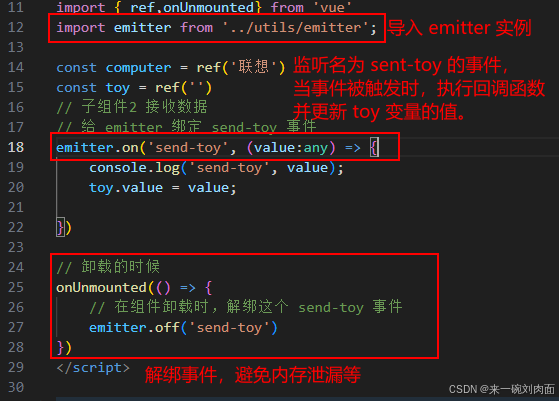
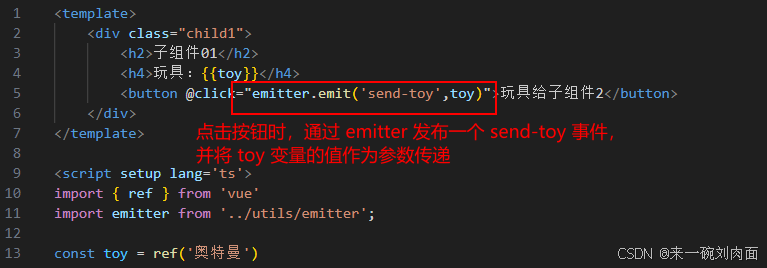
四、v - model
父传子,子传父都可
javascript
// Father.vue
<template>
<h1>父组件</h1>
<!-- v-model 用在html标签上 -->
<!-- <input type="text" v-model="username"> -->
<!-- 同上一行代码一致(底层原理) -->
<!-- <input type="text" :value="username" @input="username=(<HTMLInputElement>$event.target).value" > -->
<!-- v-model 用在组件标签上 -->
<LIU v-model="username"/>
<!-- 基本原理 -->
<!-- <LIU
:modelValue="username"
@update:modelValue="username = $event"
/> -->
<!-- 修改 modelValue 这里的ming 就是重命名,这样可以传递多个参数-->
<!-- <LIU v-model:ming="username"></LIU> -->
</template>
<script setup lang='ts'>
import {ref} from 'vue'
import LIU from './LIU.vue'
const username = ref('zhangsan')
</script>
<style>
</style>
javascript
// LIU.vue
<template>
<input
type="text"
:value="modelValue"
@input="emit('update:modelValue',(<HTMLInputElement>$event.target).value)"
>
</template>
<script setup lang='ts'>
defineProps(['modelValue'])
const emit = defineEmits(['update:modelValue'])
</script>
<style scoped>
input{
border: 2px solid skyblue;
background-image: linear-gradient(45deg,red,yellow,green);
}
</style>五、$attrs
$attrs 用于实现当前组件的父组件 ,向当前组件的子组件通信 (祖 ↔ 孙)
具体说明:$attrs 是一个对象,包含所有父组件传入的标签属性。
注意:$attrs4 会自动排除 props 中声明的属性(可以认为声明过的 props 被子组件自己"消费"了)
在 Vue 3 中,$attrs 是一个非常有用的特性,它包含了组件的所有"非 props"属性和事件。这对创建泛用组件(如包装器组件或高阶组件)非常有帮助,允许将未声明的属性自动传递给子组件。
使用场景
- 创建包装组件,允许将原始组件的属性直接传递下去。
- 处理动态属性的情况,而不必逐个声明 props。
- 结合**
v-bind="$attrs"** 自动绑定属性。
javascript
// Father.vue
<template>
<h1>父组件</h1>
<h4>a:{
{ a }},</h4>
<h4>b:{
{ b }},</h4>
<h4>c:{
{ c }}</h4>
<!-- v-bind="{x:100,y:200} 相当于 :x="100" :y="200" -->
<Child :a="a" :b="b" :c="c" v-bind="{x:100,y:200}" :updateA='updateA'></Child>
</template>
<script setup lang='ts'>
import { ref } from 'vue';
import Child from './Child.vue';
const a = ref(1)
const b = ref(2)
const c = ref(3)
// 接收 孙组件 传递过来的值
const updateA = (value:number) => {
a.value += value;
}
</script>
<style>
</style>
javascript
// Child.vue
<template>
<h1>子组件</h1>
<!-- <h4>a:{
{ a }}</h4> -->
<!-- props 没有接收,则可以使用 $attrs 来接收剩下的 -->
<h4>其他:{
{$attrs}}</h4>
<!-- 传递给 孙组件 (子组件传递给子组件的子组件)-->
<GrandChild v-bind="$attrs"></GrandChild>
</template>
<script setup lang='ts'>
// import { ref } from 'vue';
import GrandChild from './GrandChild.vue';
// 只接受一个参数 a
// defineProps(['a'])
</script>
<style>
</style>
javascript
// GrandChild.vue
<template>
<h1>孙组件</h1>
<h4>a:{
{ a }}</h4>
<h4>c:{
{ c }}</h4>
<h4>b:{
{ b }}</h4>
<h4>x:{
{ x }}</h4>
<h4>y:{
{ y }}</h4>
<button @click="updateA(2)">点击父组件a改变</button>
</template>
<script setup lang='ts'>
defineProps(['a', 'b', 'c', 'x', 'y', 'updateA'])
</script>
<style>
</style>- 访问
$attrs:$attrs是一个对象,其中的键是传递的属性名,值是传递的属性值。 - 在子组件中使用
v-bind="$attrs"将所有未声明的属性传递给一个子组件。 - 不再需要手动声明每个 prop,让组件更加灵活和易于使用。
六、refs 、parent
$refs 是一个对象,包含了注册为 ref 的所有 DOM 元素和子组件的引用。通过 $refs,可以直接访问这些元素或组件的实例,以便进行操作。
**$refs **使用场景
- 直接操作 DOM 元素(例如聚焦输入框、滚动到某个元素等)。
- 访问子组件的方法和属性。
$parent 用于访问当前组件的父组件实例。通过 $parent,可以获取父组件的属性、方法和状态。
**$parent **使用场景
- 在子组件中需要访问或修改父组件的数据时。
- 当父组件中定义的方法需要在子组件中进行调用。
$refs : 父传子,值为对象,包含所有被 ref 属性标识的 DOM 元素或组件实例。
$parent : 子传父,值为对象,当前组件的父组件实例对象。
javascript
// Father.vue
<template>
<h1>父组件</h1>
<h5>房子:{
{house}}</h5>
<button @click="changeToy">修改子组件1的玩具</button>
<button @click="changeComputer">修改子组件1的电脑</button>
<!-- $refs 包含所有的子组件对象实例 -->
<button @click="getAllChild($refs)">让所有子组件的书籍增加</button>
<Child1 ref="one"></Child1>
<Child2 ref="two"></Child2>
</template>
<script setup lang='ts'>
import { ref } from 'vue';
import Child1 from './Child1.vue';
import Child2 from './Child2.vue';
const house = ref(4)
// 每个子组件单独声明
const one = ref()
const two = ref()
const changeToy = () => {
console.log(one.value);
one.value.toy = '8520';
two.value.computer = '惠普'
}
const changeComputer = () => {
console.log(two.value);
two.value.computer = '惠普'
}
//
const getAllChild = (refs:any) => {
console.log(refs);
for (const key in refs) {
refs[key].book += 3;
}
}
defineExpose({house})
</script>
<style>
</style>
javascript
// Child1.vue
<template>
<h1>子组件1</h1>
<h5>玩具:{
{toy}}</h5>
<h5>书籍:{
{book}}本</h5>
<button @click="minusHouse($parent)">房子减少</button>
</template>
<script setup lang='ts'>
import { ref } from 'vue';
const toy = ref('奥特曼')
const book = ref(3)
const minusHouse = (parent:any) => {
console.log(parent);
parent.house -= 1;
}
// 宏函数 把数据交给外部 这样父组件就可以直接操作组件的数据了
defineExpose({toy,book})
</script>
<style>
</style>
javascript
// Child2.vue
<template>
<h1>子组件2</h1>
<h5>电脑:{
{computer}}</h5>
<h5>书籍:{
{book}}本</h5>
</template>
<script setup lang='ts'>
import { ref } from 'vue';
const computer = ref('联想')
const book = ref(6)
// 把数据交给外部 这样父组件就可以直接操作组件的数据了
defineExpose({computer,book})
</script>
<style>
</style>七、provie & inject
在 Vue 3 中,provide 和 inject 是用于跨组件传递数据的机制,无须通过 props 或事件进行逐层传递。这在需要在组件树中的多个层级之间共享数据时非常有用,特别是在复杂的应用程序中。
-
provide: 用于定义一个数据源,通常在父组件中使用。通过provide,父组件可以将一些数据或对象提供给其后代组件。 -
inject: 用于在子组件中获取从父组件提供的数据。可以在子组件中访问provide声明的数据。
使用场景
- 在多个组件中共享状态(例如用户身份认证信息、主题设置等)。
- 避免在组件间通过 props 和 events 逐层传递数据,减少代码复杂性。
javascript
// Father.vue
<template>
<h1>父组件</h1>
<h5>金子:{
{money}}</h5>
<h5>车子:{
{car.brand}},{
{ car.price }}</h5>
<Child></Child>
</template>
<script setup lang='ts'>
import { reactive, ref,provide } from 'vue';
import Child from './Child.vue'
const money = ref(200)
const car = reactive({
brand: '奔驰',
price:100,
})
const updateMoney= (value:number)=> {
money.value -= value
}
// 向后代(子,孙都可)提供数据 provide(名字,值)
// provide('qian', money)
// provide('che',car)
provide('moneyContext',{money,updateMoney})
provide('car',car)
</script>
<style>
</style>
javascript
// Child.vue
<template>
<h1>子组件</h1>
<GrandChild></GrandChild>
</template>
<script setup lang='ts'>
import GrandChild from './GrandChild.vue';
</script>
<style>
</style>使用 provide 来提供一个响应式对象(如 ref 或 reactive),子组件通过 inject 获取的对象会自动保持响应式。这意味着,在父组件中更新数据值,子组件会实时反映这些改变。
javascript
// GrandChild.vue
<template>
<h1>孙组件</h1>
<h5>前:{
{money}}</h5>
<h5>车:{
{car.brand}},{
{ car.price }}</h5>
<!-- 孙 传 祖 -->
<button @click="updateMoney(2)">花费money</button>
</template>
<script setup lang='ts'>
import { inject } from 'vue';
// inject() 接收数据
const {money,updateMoney} = inject('moneyContext',{money:0,updateMoney:(param:number)=>{}})
const car = inject('car',{brand:'未知',price:0})
</script>
<style>
</style>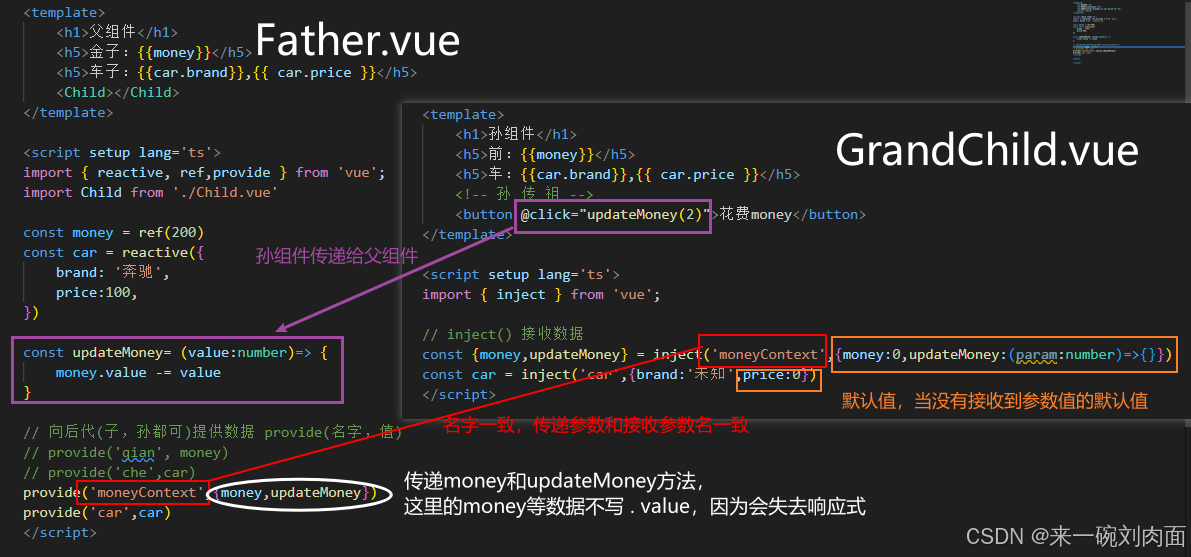
- 键的唯一性: 提供和注入的数据使用字符串作为键,因此,请确保所用的字符串是唯一的,避免冲突。
- 层级限制 :
inject只会查找最近的provide,而不会跨越多个层级。 - 响应性 : 如果注入的是一个非响应式的数据,子组件将不会自动更新。确保使用
ref或reactive以保持响应性。
八、pinia
参考之前的
九、slot
(一)默认插槽
javascript
// Father.vue
<template>
<div class="father">
<h1>父组件</h1>
<div class="content">
<!-- 组件写双标签 利用插槽 子组件使用 <slot>标签即可 -->
<Category title="热门游戏列表" >
<ul>
<li v-for="g in games" :key="g.id">{
{ g.name }}</li>
</ul>
</Category>
<Category title="今日美食推荐" >
<img :src="imgUrl" alt="">
</Category>
<Category title="今日影视推荐" >
<video :src="videoUrl" controls></video>
</Category>
</div>
</div>
</template>
<script setup lang='ts'>
import { reactive, ref } from 'vue';
import Category from './Category.vue';
const games = reactive([
{id:'01',name:'王者'},
{id:'02',name:'和平'},
{id:'03',name:'联盟'},
{id:'04',name:'求生'},
])
const imgUrl = ref('https://z1.ax1x.com/2023/11/19/piNxLo4.jpg')
const videoUrl = ref('http://clips.vorwaerts-gmbh.de/big_buck_bunny.mp4')
</script>
<style scoped>
.father{
background-color: antiquewhite;
padding: 10px;
border-radius: 10px;
}
.content {
display: flex;
justify-content: space-evenly;
}
img,video{
width: 100%;
}
</style>
javascript
// Category.vue 子组件
<template>
<div class="category">
<h2>{
{title}}</h2>
<!-- 默认插槽 -->
<slot>默认内容</slot>
</div>
</template>
<script setup lang='ts'>
defineProps(['title'])
</script>
<style scoped>
.category{
background-color: skyblue;
border-radius: 10px;
box-shadow: 0 0 10px;
padding: 10px;
width: 200px;
height: 300px;
}
h2 {
background-color: orange;
text-align: center;
font-size: 20px;
font-weight: 800;
}
</style>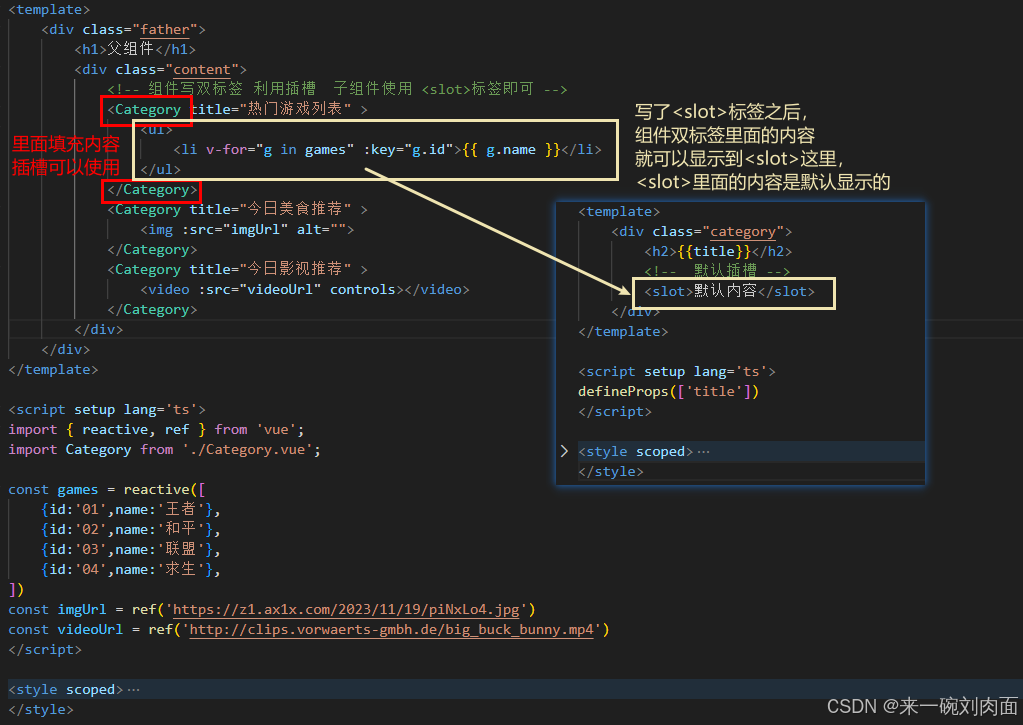
默认插槽一般只写一个<slot>即可!!!!!!!!!!!!
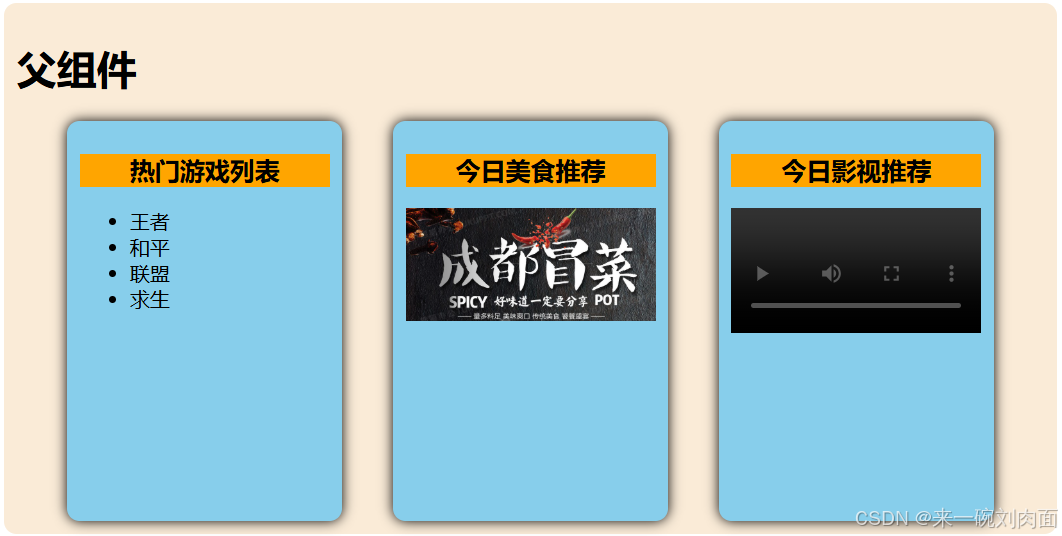
(二)具名插槽
javascript
// Father.vue
<template>
<div class="father">
<h1>父组件</h1>
<div class="content">
<!-- 组件写双标签 利用插槽 子组件使用 <slot>标签即可 -->
<Category >
<template v-slot:two>
<ul>
<li v-for="g in games" :key="g.id">{
{ g.name }}</li>
</ul>
</template>
<template v-slot:one>
<h2>热门游戏列表</h2>
</template>
</Category>
<Category>
<template v-slot:two>
<img :src="imgUrl" alt="">
</template>
<template v-slot:one>
<h2>今日美食推荐</h2>
</template>
</Category>
<Category>
<template #two>
<video :src="videoUrl" controls></video>
</template>
<template #one>
<h2>今日影视推荐</h2>
</template>
</Category>
</div>
</div>
</template>
<script setup lang='ts'>
import { reactive, ref } from 'vue';
import Category from './Category.vue';
const games = reactive([
{id:'01',name:'王者'},
{id:'02',name:'和平'},
{id:'03',name:'联盟'},
{id:'04',name:'求生'},
])
const imgUrl = ref('https://z1.ax1x.com/2023/11/19/piNxLo4.jpg')
const videoUrl = ref('http://clips.vorwaerts-gmbh.de/big_buck_bunny.mp4')
</script>
<style scoped>
.father{
background-color: antiquewhite;
padding: 10px;
border-radius: 10px;
}
.content {
display: flex;
justify-content: space-evenly;
}
img,video{
width: 100%;
}
h2 {
background-color: orange;
text-align: center;
font-size: 20px;
font-weight: 800;
}
</style>
javascript
// Category.vue 子组件
<template>
<div class="category">
<h2>{
{title}}</h2>
<!-- 具名插槽 -->
<slot name="one">默认内容1</slot>
<slot name="two">默认内容2</slot>
</div>
</template>
<script setup lang='ts'>
defineProps(['title'])
</script>
<style scoped>
.category{
background-color: skyblue;
border-radius: 10px;
box-shadow: 0 0 10px;
padding: 10px;
width: 200px;
height: 300px;
}
h2 {
background-color: orange;
text-align: center;
font-size: 20px;
font-weight: 800;
}
</style>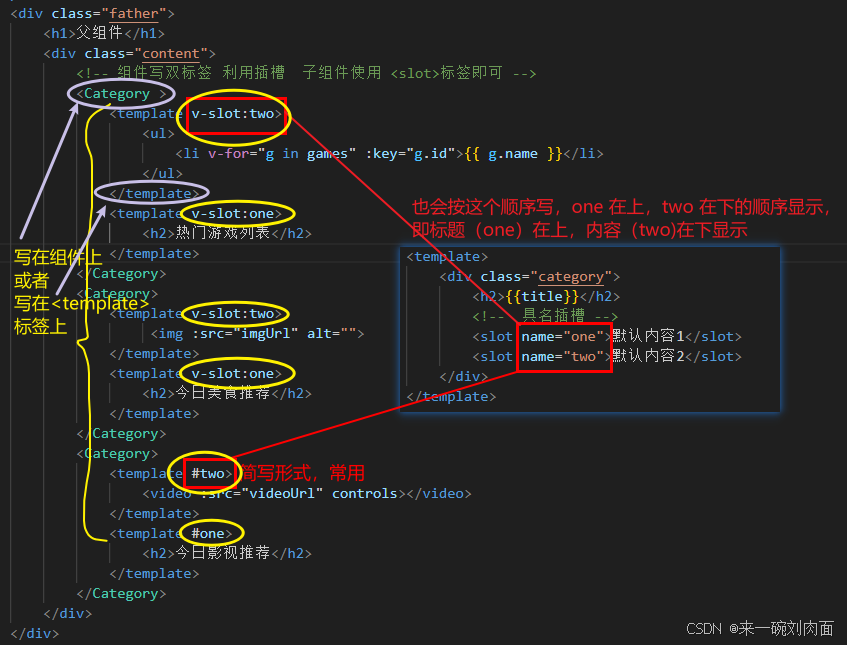
(三)作用域插槽
**数据在子组件(子组件维护各数据),但根据数据生成的结构,却由父组件决定。**即可使用作用域插槽。
javascript
// Father.vue
<template>
<div class="father">
<h1>父组件</h1>
<div class="content">
<Game>
<!-- 这里的 params 是接收子组件传递过来的打包后的对象 -->
<template v-slot:thisGame="params">
<!-- <span>{
{ params }}</span> -->
<ul>
<li v-for="g in params.game" :key="g.id">
{
{ g.name }}
</li>
</ul>
</template>
</Game>
<Game>
<template v-slot:thisGame="params">
<ol>
<li v-for="g in params.game" :key="g.id">
{
{ g.name }}
</li>
</ol>
</template>
</Game>
<Game>
<!-- 将 game 解构 -->
<template v-slot:thisGame="{game}">
<h3 v-for="p in game" :key="p.id">
{
{ p.name }}
</h3>
</template>
</Game>
</div>
</div>
</template>
<script setup lang='ts'>
import Game from './Game.vue';
</script>
<style scoped>
.father{
background-color: antiquewhite;
padding: 10px;
border-radius: 10px;
}
.content {
display: flex;
justify-content: space-evenly;
}
img,video{
width: 100%;
}
h2 {
background-color: orange;
text-align: center;
font-size: 20px;
font-weight: 800;
}
</style>
javascript
// Game.vue
<template>
<div class="game">
<h2>游戏列表</h2>
<!-- 将这些参数打包成一个对象传递过去 -->
<slot name="thisGame" :game="games" x="五哈" y="嘿嘿"></slot>
</div>
</template>
<script setup lang='ts'>
import { reactive } from 'vue';
const games = reactive([
{id:'01',name:'王者'},
{id:'02',name:'和平'},
{id:'03',name:'联盟'},
{id:'04',name:'求生'},
])
</script>
<style scoped>
.game{
background-color: skyblue;
border-radius: 10px;
box-shadow: 0 0 10px;
padding: 10px;
width: 200px;
height: 300px;
}
h2 {
background-color: orange;
text-align: center;
font-size: 20px;
font-weight: 800;
}
</style>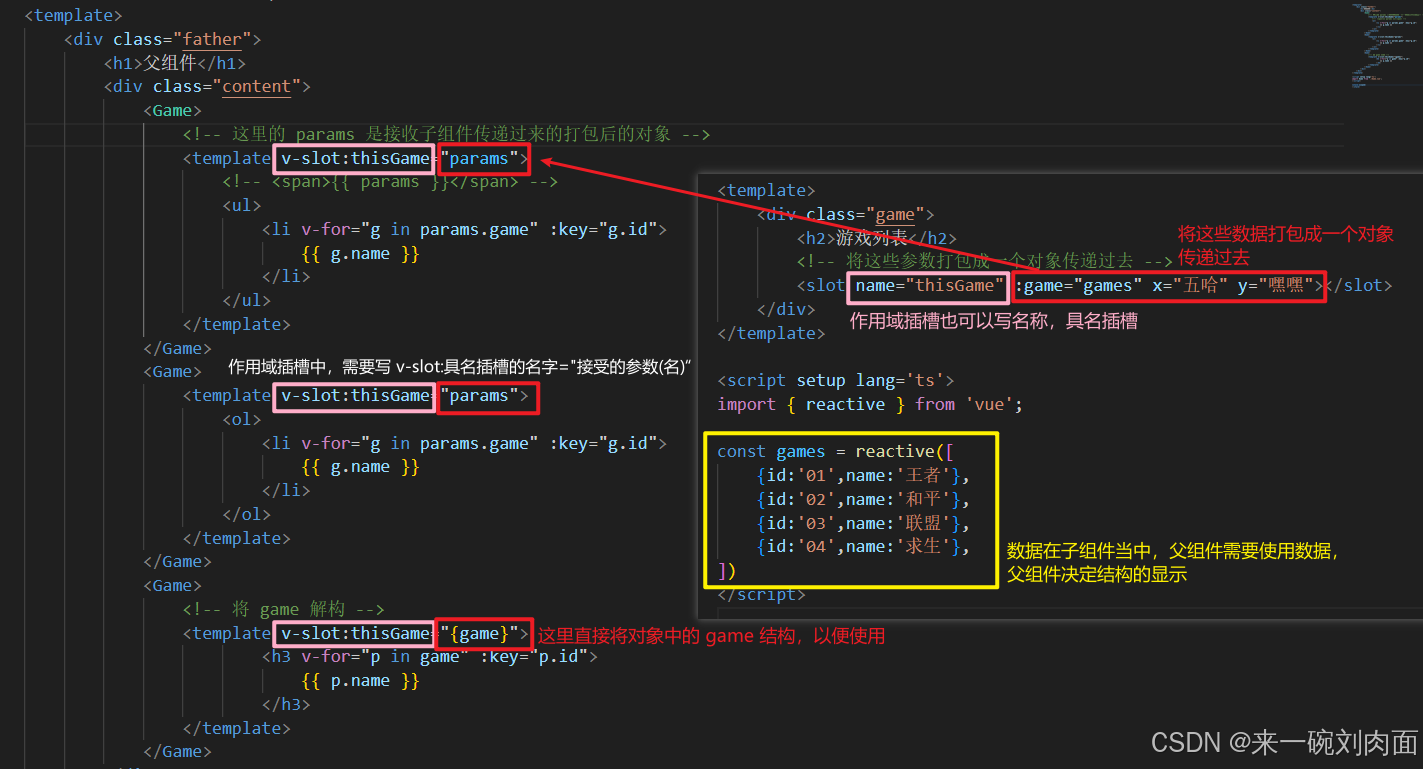
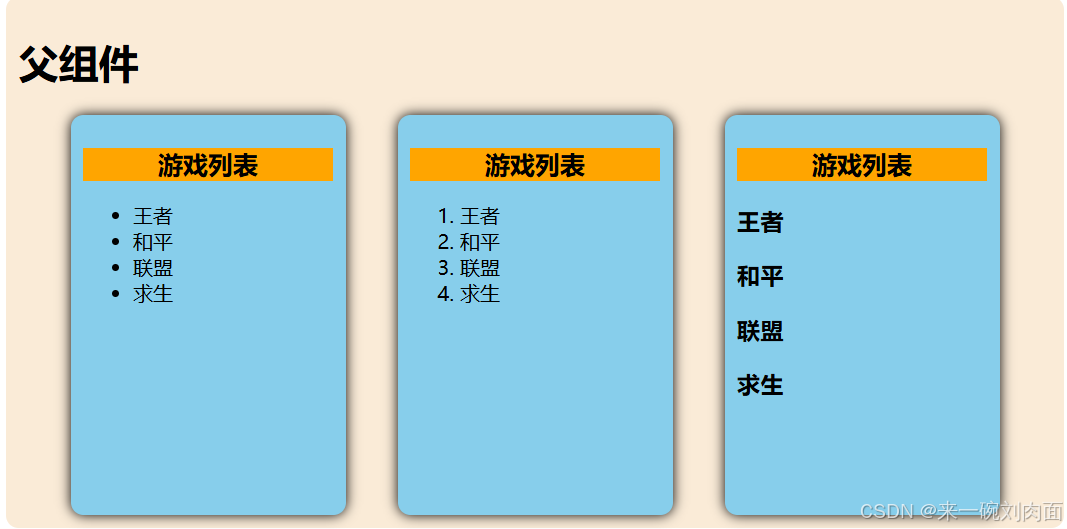
Vue 3中的组件通信方式,可以根据实际场景和需要来选择合适的通信方式,提高编程效率。